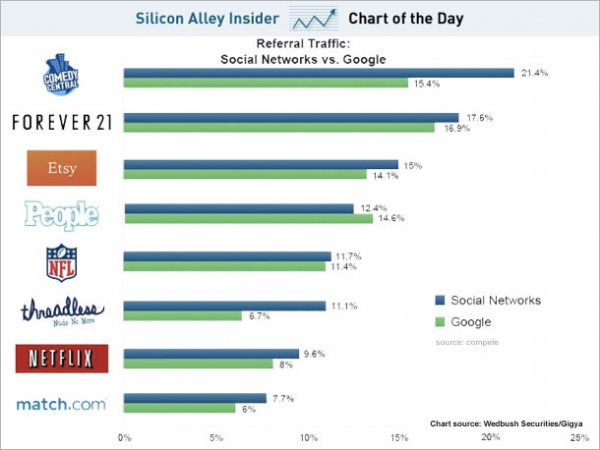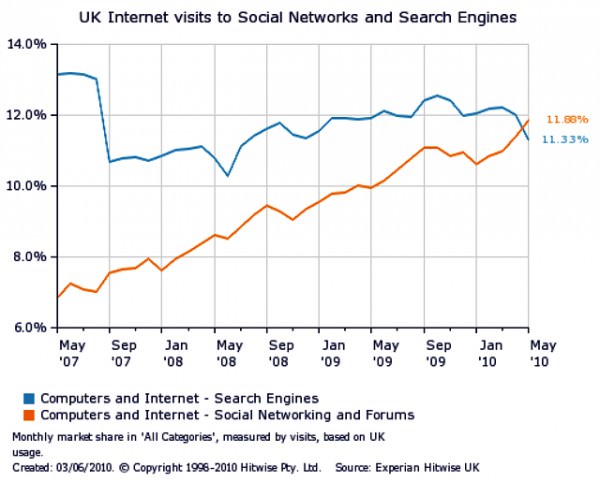Ideas on techniques for sharing great content
Everyone knows that having great content is the secret to success with content marketing, but if you stop there, that's only half the battle or you're missing half the opportunity. If you just rely on Google to find and display your content then that will only get you so far, even if you can compete in SEO which is far from easy.
The power or maybe the necessity of making your content shareable is shown by the stats below.
First we see how some companies have been successful in driving more visits from social networks through sharing content and engaging with their audiences on social networks.

Next we see the trend of the growing importance of social networks compared to search engines. Interesting and challenging stuff!

Is the concept of social and content optimisation a big deal?
Yep! For two important reasons - firstly for natural search and link-building (a prominent KPI in social media marketing is number of quality inbound links, right?), and secondly because the way people are finding and consuming content (product, entertainment, news, learning information) is fast changing.
I am not suggesting that Facebook (or social networks at large) will take over Google, who knows, yet the early evidence is that Google"€™s one-dimensional hold is nothing that it once was - optimising for both search and social is now equally important.
There are a lot of ways in how people can view your content, the marketing model has shifted from a pure, "€œHow do we push messages to drive more traffic"€ to, "€œHow do we publish and become findable in more places including search results"€. Think of your website as the hub or heart of your marketing pumping content outwards but with a backflow of comments and interactions.
We still want traffic coming our websites of course, and if we do it right then they will. But, if we value the creation of more entry points to connect with our brand across the Internet then we must increase the reach of our content in and beyond the SERP"€™s and into social referral traffic.
So how can you increase the volume of social referral traffic?
We reckon there are three key factors at play here:
- How fascinating, valuable, informative or entertaining your content is
- How easily shareable you have made it (hint: not just for Facebook!)
- How much time you are spending third party sites and social networks sharing your story and interacting with your current and potential current
If you can inspire someone then their friends are more likely to be interested in the same thing ("€œbirds of a feather fly together"€), so you"€™re likely reaching and then leveraging a well-targeted audience.
First, we believe that it"€™s important to remember that great marketing is born from great ideas, not tactics, tools, widgets or technology platforms - so with that in mind, here are our 5 tips:
Tagging, bookmarking and sharing
Before Facebook"€™s became so ubiquitous, widgets were the primary tool that allowed others to grab your content and share it on their blogs, Facebook profiles and social bookmarking sites. Examples of these widgets include the Share This or Add This plugins.
Each social media site has its own range of share buttons and badges, they are very similar to widgets though focus on one application of course, for example Facebook"€™s "€œShare"€ or Stumble Upon "€œStumble"€ - and the button du jour - ReTweet!
According to social sharing plugin AddThis, Facebook is far and away the number one place where people share content through their widget, taking 39% of the pie, Gigya recently claimed it was 44% on their blog as well. The point is to consider that around 60% of shares are being made outside of Facebook - so at least include Twitter and maybe two others.
Here are the full stats showing the popularity for sharing services in 2010 which show the rising popularity of Stumbleupon which has search benefits too.

The AddThis"€™ data shows that its toolbox (which displays just the major networks) performs 40% better than its regular widget. The AddThis widget has functionality that shows different buttons for each visitor based on what sites they share to the most.
Gigya, which I am increasingly interested in, has this tool that allows people to share to multiple networks at once without leaving your site.
Remember that Google see the value of those links and activity from those social networks.
Enable others to help content travel further
The fact is that great content gets shared - back in the day it was pretty much forwarding by email - now it"€™s wider: RSS subscribers, content syndication, email newsletters, status updates, social bookmarks, promotions and tweets - they all improve reach and need to be employed with the big idea in mind, and as you create the content.
You will have heard no doubt the idea of encouraging people to mash-up, or augment and curate, your content - this further increases the reach and appeal of what you"€™ve done and drives traffic back. The classic example here is YouTube"€™s cut and paste web code to embed video (your video) into any web page. So, encourage re-use and sharing - it will all flow back to you, the originator
How far your content travels will, logically, be related to how well it meets the needs of the audience.
Form a connection
You want to attract visitors and you really want the visitor to register in some way - why? Connected visitors tend to engage more than anonymous visitors and they"€™ve already engaged once by registering. You will most likely see more time on site, more page views, lower bounce rate and, if you"€™re operating an e-commerce site, increased sales.
However that traditional long and cluttered registration form is a bit of a pain in the neck for users, and most may not really know you. Step up social sign-in as an option to help solve this.
Social sign in can cause duplicate records on larger sites already capturing user data, advanced implementations can check when a registrant may already have a conventional account, and asking those users to sync the accounts with Facebook or Twitter, for example.
Gigya reports that 46% of users sign in with Facebook, beating out Google as the preferred social profile for making connections to other sites. Echo, a multi-platform sign-in module you can use, reports that Yahoo is number one (34%) for sign in, ahead of Facebook (25%) on the top 10 sites they serve.
Whatever the data, it"€™s clear that providing choices for just the major networks can increase your chances of registration success.
Encourage interaction
A user leaving a comment on your site is great, sharing that comment with their social network is going to drive traffic. Today, through software like Echo, Facebook, Gigya and Disqus, you can easily encourage people to share their comments more broadly.
Since Facebook "€œLikes"€ show up as one line of text, and "€œShares"€ show up as a link with a comment, advanced marketers are seen encouraging Shares immediately after someone presses the Like button.
It"€™s more obvious how to know how to implement for a news site or a blog, for other site types it"€™s a case of figuring out where to implement social commenting and where to implement social plugins such as the Facebook "€œLike"€ button on. Get it right, test it, it can drive traffic whilst providing social proof that your content might be for "€œme"€, too.
Have real purpose
- What are you setting out to do at the business level? Build sales, influence or credibility maybe?
- Align those business goals with the customer needs and ensure that manifests as relevant content, specifically for your audience (not everybody)
- Get involved, online conversation is at the heart of social, not just "€œlistening"€
- Take on new challenges to keep fresh, test new tools and help spark interest with your user base
- Be the go-to resource, even link to competitors and cement you position as a trusted and valued reference
Think of it like some kind of content / social karma, you"€™ve got to give to get so just concentrate on doing an honest to good job of providing what your market really, really values. Is this not what you wish some brands would do for you? Of course be real and even a bit humble in the process - most of us value that authenticity.
Use this purpose to employ relevant strategies, tools and tactics (not all - as even the free ones cost in some shape or form).
Are there any tips, experiences or stats on social sharing that you can share?


















